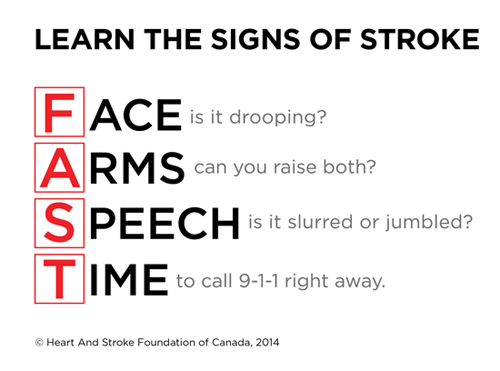If you or a loved one suffered a stroke, would you be able to recognize the three key signs to take quick action?

Your face may be drooping, you may not be able to move your arms and your speech could become slurred or jumbled. While there are other symptoms of a stroke, health officials say these are the major red flags to pay attention to.
June is Stroke Awareness Month and a good time to remind Canadians of the major symptoms – when it comes to stroke, the faster you get to medical help, the better the odds of recovery.
“I don’t think people recognize the signs of stroke enough to know. This is a reminder that as soon as you see these symptoms you have no time to waste, you need to call 911 immediately. We now have a lot of newer therapies that work on patients with stroke but they’re time sensitive,” according to Dr. Patrice Lindsay, director of stroke at Heart & Stroke.
READ MORE: Stroke in young Canadians is on the rise, Heart & Stroke warns. Here’s why
Lindsay told Global News that in the organization’s latest polling, over 40 per cent of Canadians said they knew someone who had a stroke.
But when they were asked about stroke signs, 40 per cent of Canadians admitted they didn’t know any of the symptoms of stroke. Only 24 per cent knew at least two signs and only six per cent knew three signs.
Health officials rely on the FAST mnemonic – the easiest way to recognize signs of stroke. It’s translated into several other languages and used globally.

READ MORE: Pay attention to stroke warning signs, Heart & Stroke says

Get weekly health news
Look at the person’s face, for starters to see if one-half is drooping or frozen in place.
Check to see if you or your loved one can raise both arms, or if they’re unable to move one or more limbs at all.
When it comes to speech, you could be struggling to make sentences or you could sound like you have a mouthful of marbles.
Time is crucial. Brain cells die at a rate of two million per minute after stroke, Lindsay warned. Restoring normal blood flow sooner rather than later makes a significant difference.
Drugs that help with clearing clots need to be administered within an hours-long window.
READ MORE: Heart attacks on the rise in younger Canadians, experts say
Other symptoms that aren’t included range from vision issues, such as blurry eyesight, to the sudden onset of a crippling, painful headache. They’re typically paired with the FAST symptoms, too.
Lindsay has invaluable insight into the plight of stroke survivors. She was 38 when she suffered a stroke while reading a bedtime story to her kids, 2 and 5.
“I was feeling unwell and within a couple of minutes, I lost feeling of my entire left side of my body. I couldn’t move my arm or leg. Luckily my husband heard me bang my other leg on the floor and called 911,” she recounted.
The ambulance arrived within minutes and she was rushed to a hospital that treats stroke emergencies.
READ MORE: Some Canadians misunderstanding stroke recovery process, report says
Lindsay suffered a minor stroke. It took six months until she recovered full but she couldn’t drive at first and had to rely on friends and family.
There are 62,000 strokes recorded in Canada each year – 80 per cent of people survive.
Only 16 per cent of stroke patients who leave hospital get into rehabilitation right away.
There are certain risk factors for stroke that Canadians need to pay attention to, too.
READ MORE: Stroke more than doubles risk of dementia, Heart & Stroke says
The biggest risk factor is high blood pressure – 60 per cent of stroke survivors live with this chronic condition.
Diabetes is another risk factor. Atrial fibrillation, or an irregular heartbeat, is another medical condition that puts you at a greater risk of stroke, followed by lifestyle, such as a poor diet, lack of exercise, being overweight or obese and smoking.
Read more about Stroke Awareness Month.
carmen.chai@globalnews.ca
Follow @Carmen_Chai






Comments